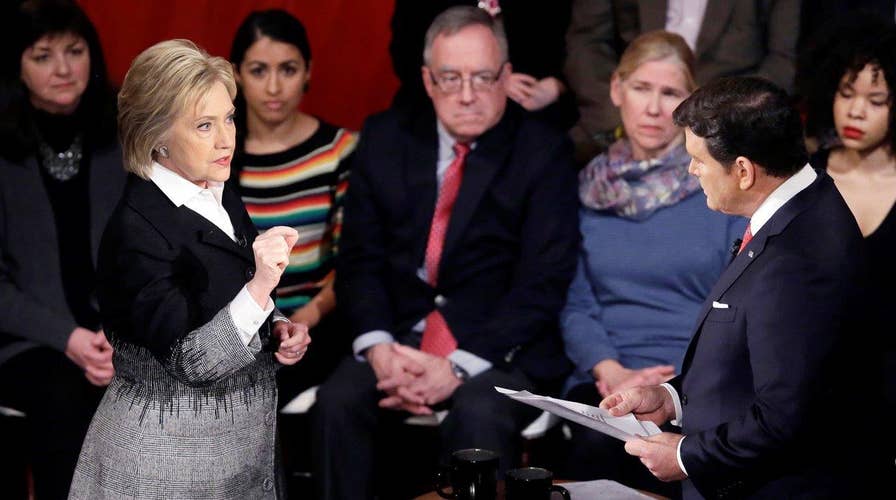Clinton questioned about emails during Fox News Town Hall
Clinton inaccurately claims the State Department decides what is and is not classified
WASHINGTON – Seven congressional Democrats, including the ranking members of the Senate and House intelligence committees, have written to the State Department and Intelligence Community watchdogs demanding that their investigations of Hillary Clinton's private email be "impartial, independent and diligent."
The five-page letter accuses the inspectors general of politicizing the investigations. The letter was first reported by Politico and later confirmed by Fox News.
"Based on public reports and communications from your offices to Congress, we have serious questions about how this review is being conducted...Already, this review has been too politicized. We are relying on you as independent inspectors general to perform your duties dispassionately and comprehensively," the March 9 letter states.
The letter was signed by Sen.Dianne Feinstein, D-Calif., and Rep. Adam Schiff, D-Calif., ranking members of the Senate and House Intelligence Committees respectively.
A congressional source close to the email reviews said the letter appeared to be an extension of the Clinton campaign's "shoot the inspector general" strategy.
In recent media interviews, campaign spokesman Brian Fallon accused State Department inspector general Steve A. Linick of engaging in a “fishing expedition.”
He also accused Intelligence Community Inspector General I. Charles McCullough III of coordinating with Republican lawmakers to leak negative reports about Clinton. Both McCullough and Linick are Obama administration appointees.
The letter by the Democratic senators claims that “a number of allegations about the classification of specific emails made by the (ICIG) appear to have been reached in error and contained inaccuracies,” and specifically points to several emails sent to senators that purportedly had contained classified info on Aug. 11.
Since then, according to the letter, it became clear that at least one of those emails did not in fact contain classified information, and the initial claim that another email was highly classified was later reversed.
“Classification determinations are complex, subjective, often in dispute between different agencies, and are not normally within the purview of Inspectors General,” the lawmakers wrote.
“We are concerned that those involved in the review process have not sufficiently taken these complexities or the interagency differences on each email into account.”
However, the congressional source who spoke with Fox News said the letter missed the mark on several fronts, including a "completely false" statement about the classification process.
"The Intelligence Community Inspector General has not determined whether the Clinton emails contained classified information," the source said. "Recent sworn declarations from the CIA said the emails contained classified information when they hit Clinton's server. The ICIG was passing on the CIA's findings, and was not the decision maker. This is also true with the NGA (national geospatial) and other agencies."
One of the State Department's central arguments for explaining away the more than 2,000 emails containing classified information -- including more than 80 secret and 22 top secret messages -- is that the information came from parallel reporting in the news media.
"This is not a valid excuse for the mishandling of intelligence,” the source said.
As Fox previously reported, an email sent by Huma Abedin, which kickstarted the FBI probe, contained detailed information about pro-government forces during the Libyan revolution. The intelligence was determined to come from Africom as well as satellite imagery and other sources.
The Democratic signatories gave the inspectors general until the end of the month to respond to their questions attached to the letter.
At the Democratic debate Wednesday evening, Univision Debate Moderator Jorge Ramos asked Clinton if she would withdraw from the presidential race if faced with criminal charges.
"That is not going to happen. I'm not even answering that question," she responded, adding that nothing she sent or received through her private email and server was marked classified at the time.
However, that statement is undercut by the January 2009 classified information non-disclosure agreement signed by then- Secretary of State Clinton. In that NDA, Clinton confirms her understanding that classified material is based on content, not on whether it is marked.

























